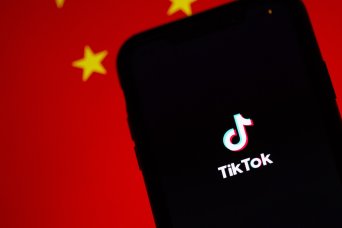- About
- Topics
- Picks
- Audio
- Story
- In-Depth
- Opinion
- News
- Donate
- Signup for our newsletterOur Editors' Best Picks.Send
Read, Debate: Engage.
| topic: | Discrimination |
|---|---|
| located: | Hong Kong, China |
| editor: | Amy Liu |
Even though the short video social media platform Douyin (also known as TikTok internationally) is trending - some users may no longer be able to create their own original content on it since influencers are prohibited from speaking Cantonese, a dialect of the Guangdong province in Southern China - when live streaming. Concerns have mounted as China's 20th Communist Party Congress, held in mid-October, has been accompanied with a heightened suppression of the Cantonese language and a stricter monitoring of speech.
According to reports, "Guangdong Liangzai Fengshao," a male influencer with over 4 million followers on Douyin who specialises in making funny short videos in Cantonese, uploaded a video in September complaining that Douyin claimed Cantonese was an "unrecognised language" as an excuse to remind him to speak Putonghua (Standard Chinese). He claimed that Douyin even punished others by restricting their traffic or blocking their accounts.
Due to Douyin's ability to generate subtitles in Cantonese, he doubts its intention of blocking the language. “There are more than 100 million people speaking Cantonese... How come [Douyin says] that [it] cannot recognise our language? […] it means you don't deserve our Cantonese users."
Following his announcement to stop live-streaming on Douyin, at least ten other influencers followed suit, including a Cantonese Opera performer, a songwriter and a car retailer, many of them asking “is it wrong to speak Cantonese?”
According to the the Douyin hotline staff, the user accounts will only face the risk of being banned when they ignore the reminder to speak in Putonghua during broadcasts when the speech recognition technology registers Cantonese words. The company did not, however, comment directly on whether the aim of the identification of the video’s language is to avoid sensitive topics, or to discriminate against the language altogether.
There are discussions about why only Cantonese users are being banned at this time. Commentators from news media mentioned that since Hong Kong uses Cantonese as a protest tool, the language is representative of a kind of foreign thinking and a social consciousness, which could threaten cultural aspects of the mainland. The involution and contraction of reform and opening up, as well as the development of Hong Kong's mainlandisation, mark the weakening of Hong Kong and the integration with China.
Reports from one data platform in 2021 show that the number of Guangdong users of Duoyin ranked at the top among other provinces in China. It is therefore strange for the platform to ban this language from its potential customers. However, it is not the first time Cantonese has been prohibited as Duoyin blocked live-streaming in Cantonese two years ago claiming that content-producers violated its regulations.
Although Douyin is a private company, its operations are under the supervision of the government, which may collaborate in its muffling of Chinese subcultures. For example, the Ministry of Culture and Tourism of PRC announced that any live-streaming shall adopt "delayed live broadcast," strengthening real-time monitoring of user-generated content such as comments and bullet subtitles.
Keeping in mind the authority’s attitudes towards dialects by the private company, it is believed that the suppression of dialect will affect the spread and inheritance of Guangdong culture. As Putonghua is the official language in China, teenagers have been taught Putonghua at school in Guangdong and can rarely speak or learn Cantonese from their parents or private dialogue. Cantonese has a history dating back over a thousand years: it is necessary for the Chinese government to bear the responsibility of protecting this language and culture.
Photo by Solen Feyissa

